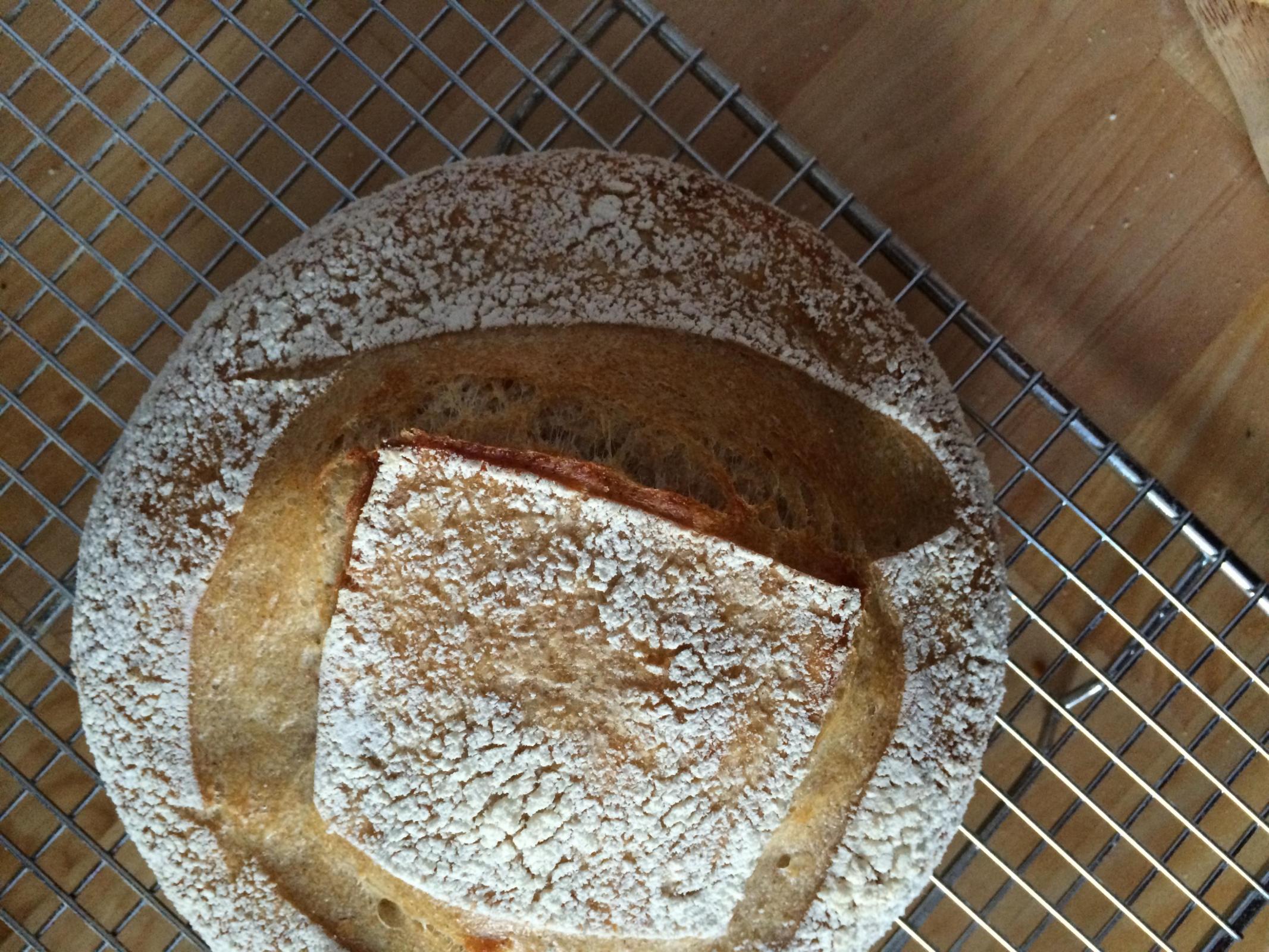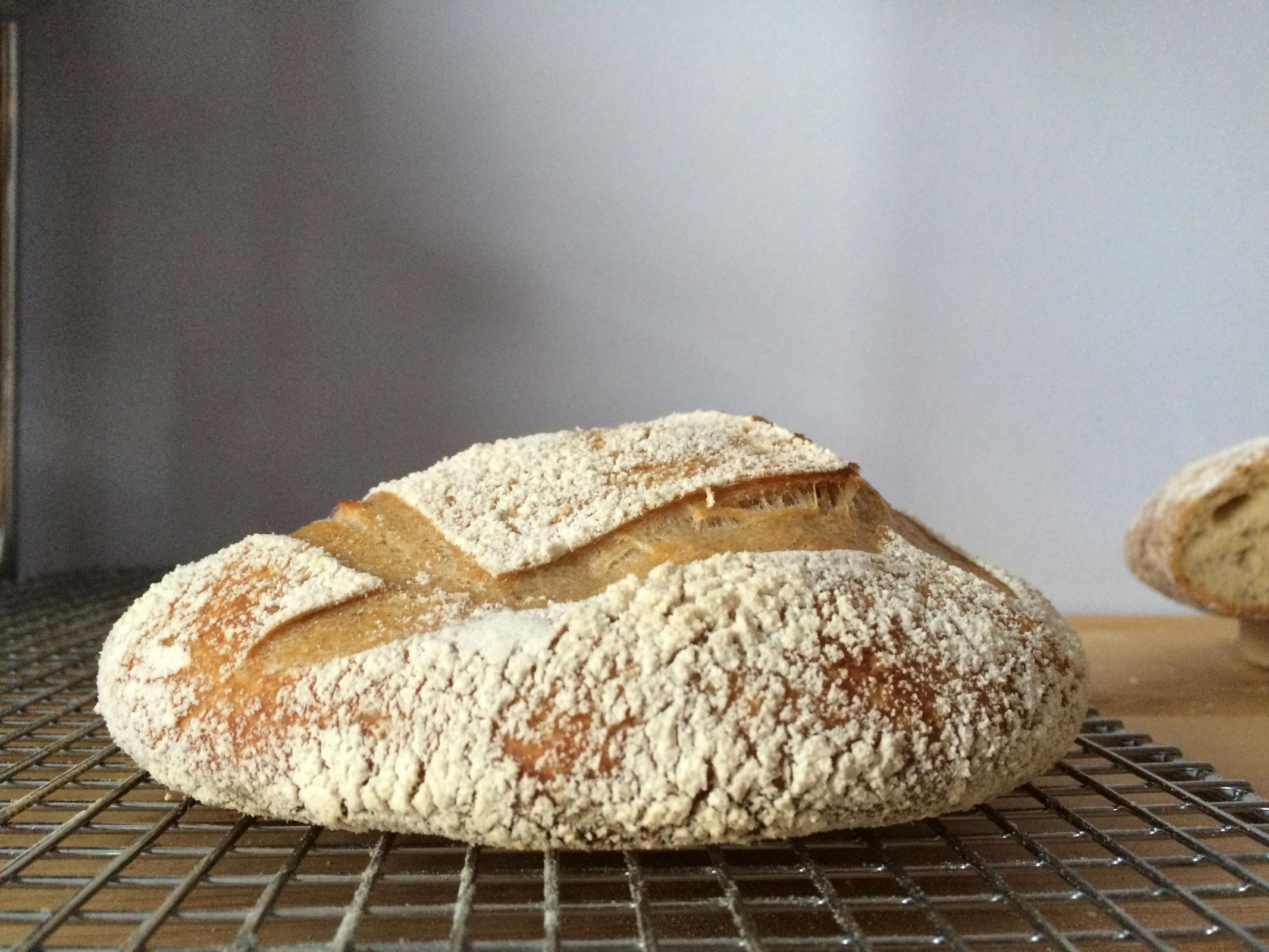Hello All,
I've been a silent forum reader for several years now while I've been on my sourdough journey. After all of these years, I still can't seem to get proper ovenspring out of my boules.*
So here I come to you, with meticulous detail, about my formula and process in hopes that perhaps you can help find a solution.


I've used the standard Chad Robertson's Country Loaf, using 500g TFW to shape two small boules.
| Ingredient | Brand/Source | Weight (g) | Baker's % |
| Total Flour | 500.00 | 100% | |
| White Flour | Heckler's High Gluten AP | 450.00 | 90% |
| Whole Wheat Flour | King Arthur Whole Wheat | 50.00 | 10% |
| Water | NYC Tap | 375.00 | 75% |
| Levain | Fed flour from above | 100.00 | 20% |
| Salt | Bob's Red Mill Coarse Sea Salt | 10.00 | 2% |
Here is my process chart with time, temperature, and notes, which I will go into more detail about:
| Feed Levain Low Inoculation | 12:00 PM | 12:00 PM | 6-8 Hours | 6:45 | |
| Mix -> Autolyse | 84.0 | 6:45 PM | 6:45 PM | 0:30 | Float Test Passed/Water @ 77°F |
| Salt -> Bulk Fermentation | 84.0 | 7:15 PM | 7:15 PM | 0:30 | |
| Fold 1 | 84.0 | 7:45 PM | 7:45 PM | 0:30 | Aggressive Fold |
| Fold 2 | 84.0 | 8:45 PM | 8:15 PM | 0:30 | Aggressive Fold |
| Fold 3 | 84.0 | 8:45 PM | 8:45 PM | 0:30 | Aggressive Fold |
| Fold 4 | 84.0 | 9:20 PM | 9:15 PM | 0:30 | Supple Dough! |
| Fold 5 | 84.0 | 9:45 PM | 9:45 PM | 0:30 | |
| Fold 6 | 84.0 | 10:15 PM | 10:15 PM | 0:30 | |
| Divide/Preshaping -> Bench Rest | 84.0 | 10:45 PM | 10:45 PM | 0:30 | Windowpane Test Passed |
| Shaping -> Proofing | 45.0 | 11:20 PM | 11:15 PM | Overnight | 7:50 |
| Temper Boule #1/Preheat at 500° F | 7:10 AM | 7:30 AM | 0:30 | Broil Hi | |
| Boule #1 in the Oven/Reduce to 450°F | 7:35 AM | 8:00 AM | 0:20 | Oven at 500°F! Asterisk Score. | |
| Remove Steam Cover/Temper Boule #2 | 7:55 AM | 8:20 AM | 0:10 | No oven spring... Maybe need to temper final proof longer? | |
| Rotate Boule #1 | 8:05 AM | 8:30 AM | 0:10 | ||
| Pull Boule #1/Reheat Oven to 500°F | 8:15 AM | 8:40 AM | 0:10 | Good color, scoring too shallow, little to no volume | |
| Boule #2 in the Oven/Reduce to 450°F | 9:00 AM | 8:50 AM | 0:20 | Letting Boule #2 proof longer/Deep angled scores | |
| Remove Steam Cover | 9:25 AM | 9:10 AM | 0:10 | Maybe more steam? | |
| Rotate Boule #2 | 9:40 AM | 9:20 AM | 0:10 | Still flat and uneven | |
| Pull Boule #2 | 9:40 AM | 9:30 AM | |||
| Finish Bake Cycle | 9:30 AM |
So, I fed the starter with a low inoculation, as Chad does, and let it ferment until it passed the float test.
I mixed, autolysed, and began doing turns every half-hour, starting aggressively, and then moving to more gentle turns as the dough developed until it passed the windowpane test.
I bench the dough and preshaped, (it held it's shape beautifully, better than I've ever seen,) after 25 minutes resting.
I shaped and then retarded the dough in homemade banneton baskets lined with floured linen at 45 degrees Fahrenheit for close to 8 hours.
I removed the first boule while preheating the oven to 500 degrees F and cast iron combo cooker for 25 minutes to come up in temperature before baking.
I scored the loaf and baked 20 minutes covered and 20 minutes uncovered @ 450 degrees F.
The boule was flat.
The second boule, I thought I'd let come to temperature and finish proofing for a little over an hour @ ~80 degrees F ambient temp, as I thought the first boule had been underproofed.
Baked 20 minutes covered and 20 minutes uncovered with similar results as the first one.
So, with all of that, what could I be doing wrong?
- Perhaps I'm very bad at shaping the dough?
- Maybe my dough is underproofed? Overproofed?
Thank you guys for taking the time to look through all of this information. As I hope you can see, I've been trying very hard to narrow down the variables at play here by keeping meticulous details. Any suggestions??
In terms of taste this is one of the most beautifully complex breads I've ever baked.
I've baked several dozen loaves over the years and I've experienced pretty much the same results. I'm not always a bake-by-numbers baker, but I try to take meticulous notes to quantify what I'm experiencing in hopes of better troubleshooting. Anyone love looking at this data to find errors or possibly more variables I'm missing?
*Except for an enriched sourdough that contained buttermilk, oats, and honey.
Perhaps you have not shaped your loaf to build a strong skin, or you have not let it rise sufficiently after forming.
Ford
I wonder, now that I've seen the details, whether the gluten has been hydrolyzed by being in the acidic conditions for a long time, about 11 hours at 84°F then 8+ hours at 45°F. The long times would not bother the gluten so much with commercial yeast, but under the acidic conditions, it might have been greatly hydrolyzed.
Ford
I've never heard of that. I'm going to do some digging, thank you!
Show us the crumb shot, it's much easier to understand what's going on when you see what's inside.
It kind of looks like excessive hydration plus insufficient gluten development. This resulted in a steam bubble which tore the crumb in half, resulting in cavity which collapse once the pressure was relieved. Is Hecker's the same as Ceresota? I tried Ceresota once and the dough simply would not hold together.
Yes, that sounds perfectly right. And yes, Ceresota and Heckler's are the same. Thank you! I had a 10-pound bag of Heckler's and I thought I'd done good to use it. That, with the over-hydration, seems like the culprit. I'll take these notes and try something new on Tuesday!
line up. 29°C is pretty warm... still...
Ok, guys and gals!
Thank you so much for you input, here's what changed:
And here is the result:
Everything is amaing and great! Literally breathtaking oven spring, so much so that I think I need a banneton that's bigger than the one I used here, but smaller than the one I used last time... I think I just need to buy a real one. Also, I need to work on my shaping of high hydration dough, but this was an amazing encouraging step.
Thank you all!
Increase the amt of dough, and use the larger banneton? Or a deeper one, not so wide?